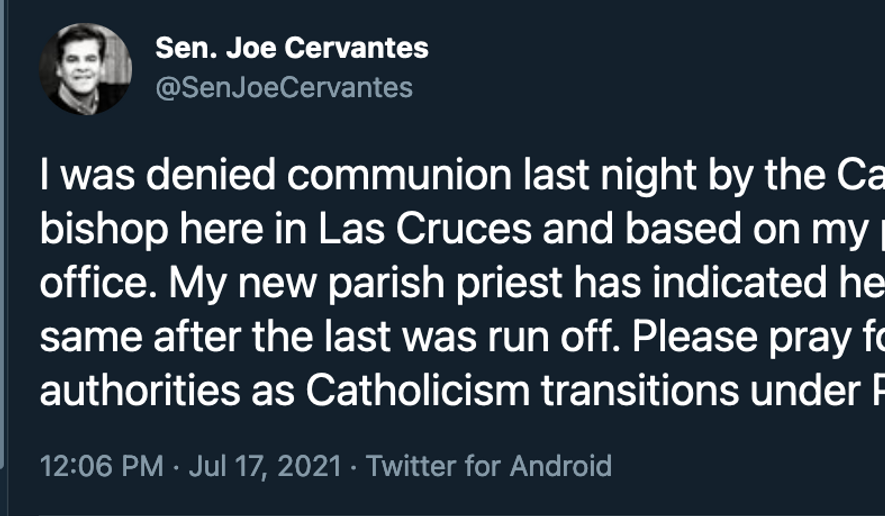A Roman Catholic parish in Las Cruces, New Mexico, told a state senator he could not receive Holy Communion because he supports a pro-abortion bill.
“I was denied communion last night by the Catholic bishop here in Las Cruces and based on my political office,” Sen. Joe Cervantes, Las Cruces Democrat, wrote on Twitter.
“My new parish priest has indicated he will do the same after the last was run off. Please pray for church authorities as Catholicism transitions under Pope Francis,” he wrote.
I was denied communion last night by the Catholic bishop here in Las Cruces and based on my political office. My new parish priest has indicated he will do the same after the last was run off. Please pray for church authorities as Catholicism transitions under Pope Francis.
— Sen. Joe Cervantes (@SenJoeCervantes) July 17, 2021
The Las Cruces Sun-News newspaper reported that Mr. Cervantes, who has served in the state legislature since 2001 and the state senate since 2013, attended a mass at the Carmelite Monastery on July 16 and was denied the sacrament.
Mr. Cervantes was a co-sponsor of New Mexico Senate Bill 10, a measure repealing a 1968 ban on almost all abortions in the state.
Although the 1968 measure was considered “unenforceable” in light of the 1973 Supreme Court decision in Roe v. Wade, which made abortion a national constitutional right, its formal repeal was disfavored by the Archdiocese of Las Cruces, spokesman Christopher Velasquez said.
“The New Mexico legislature recently passed some of the most extreme pro-abortion legislation in the country,” Mr. Velasquez said. “Prior to the passage of the legislation, both Bishop [Peter] Baldacchino, and his pastor had reached out to him, and they had reached out multiple times in order to convey to him the teaching of the Catholic Church. Senator Cervantes never answered or responded to diocesan communications.”
Mr. Cervantes is reported to be a member of St. Albert the Great Catholic Church in Las Cruces.
Mr. Velasquez said the state senator’s unresponsiveness “led to a formal letter being sent to him” in which officials said a vote for the bill “would constitute a grave moral error” and that Mr. Cervantes thereby “should not present himself for communion.”
The diocesan spokesman said the letter was a private, “pastoral” communication and “something neither Bishop Baldacchino nor the pastor would ever have publicized.
“As a diocese we regret that the senator chose instead of entering into a dialogue with the diocesan official, that he felt the need to express himself on Twitter, which we would consider to be not the most appropriate outlet to express his concern,” Mr. Velasquez added.
Repeated calls to Mr. Cervantes by The Washington Times were not returned, nor did the legislator respond to an email request for comment.
The issue of Catholic politicians, abortion, and eligibility for communion is a contentious one for the church.
In June, the U.S. Conference of Catholic Bishops voted overwhelmingly to develop a document about the Eucharist which reportedly would include guidance about the worthiness of those who support abortion to receive the sacrament.
But during the meeting, Bishop Kevin Rhoades of Indiana’s Fort Wayne-South Bend Diocese told delegates that such guidance was “no longer” being prepared.
“We never meant it as it’s been interpreted in many media sources,” he said at the time.
That apparent reversal followed statements from some bishops, including Cardinal Wilton Gregory of Washington, D.C., that pro-choice politicians such as President Biden would be welcome to receive communion in their diocese.
• Mark A. Kellner can be reached at mkellner@washingtontimes.com.




Please read our comment policy before commenting.